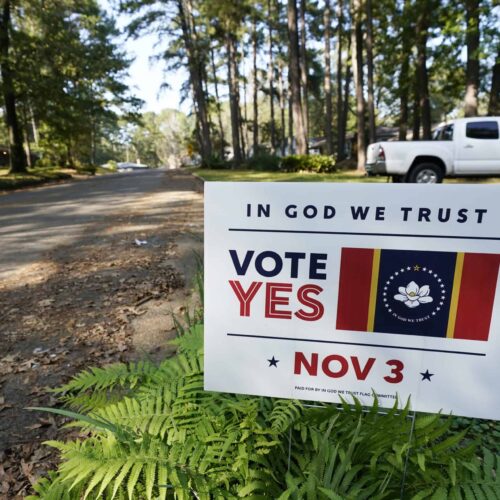Introduction
More than a century ago, white Mississippians devised a way to almost guarantee that no African American — or Black residents’ preferred candidate — would ever hold real political power in the state. It’s among the discriminatory measures voters changed across the country last week.
After months of unrest sharpened the nation’s attention to racial justice issues, voters in several states approved ballot measures and amendments Tuesday, dumping symbols and language linked to slavery and the Jim Crow South.
Sign up for The Moment newsletter
Our CEO Susan Smith Richardson guides you through conversations and context on race and inequality.
Alabama voters approved an amendment that will begin the process of, among other things, removing racist language from the state’s constitution. The clauses have been invalidated by amendments to the U.S. Constitution and U.S. Supreme Court decisions but they’re still in the state’s official founding documents.
Utah and Nebraska voted to excise slavery and involuntary servitude as criminal punishment from their constitutions.
A slim majority of Rhode Islanders voted to remove Providence Plantations from the state’s official name — a measure that was defeated in 2010. Opponents argued that “plantation” in this context shouldn’t conjure images of slavery when the word means colony or farm.
Proponents of the state measures say they’re a step in the right direction and help to educate voters on America’s racist roots. It’s hopeful and healthy, they say, that people across the country are asking tough questions about language, symbols and history.
“It’s a great launching point to really dig into working on more criminal justice issues and racial justice issues,” said Brad Christian-Sallis, a Nebraska organizer.
Others say the efforts fall short. Mississippi, for example, voted to adopt a new state flag, but it also reelected U.S. Sen. Cindy Hyde-Smith, a Republican who reveres Confederate history and has been photographed with Confederate regalia, said Corey Wiggins, executive director of the Mississippi NAACP.
Meanwhile, Mississippi needs a stronger response to fight the coronavirus pandemic, and policies to improve areas like public education and the African American unemployment rate, Wiggins said.
“So while we have taken the symbolic step of changing the state flag, we also have to take the practical step to make sure our policies are aligned in a way that treats everybody in the state with dignity,” Wiggins said.
The Utah and Nebraska efforts are part of a national movement to remove the language of slavery and involuntary servitude for punishing crimes from state constitutions and then eventually from the 13th Amendment of the U.S. Constitution, said Utah state Rep. Sandra Hollins, a Democrat who led the effort in the Beehive State. The change helps Black Utahns see themselves reflected equally in the state’s founding documents, Hollins said.
“When you talk to people, it’s like a no-brainer,” said Nebraska state Sen. Justin Wayne, a Democrat who spearheaded the effort in the Cornhusker State.
The Nebraska legislature passed the constitutional amendment 44-0 in March 2019, a step that was required before it went to state residents as a ballot measure. But last month, state Sen. Mike Groene, a Republican, said he regretted his vote.
“I got caught up in our present national atonement mood over an evil scar on the American conscience,” Groene wrote in a column published by the North Platte Telegraph. “Our state constitution should not conflict with the U.S. Constitution, and this issue is not about the ownership of slaves but instead concerns the rehabilitation and punishment of individuals who have committed crimes against society.”
Less than a third of Nebraskans opposed changing the language — which advocates attribute, in part, to confusing language on the ballot.
“We still got a lot of work to do in Nebraska, even just on this issue,” Christian-Sallis said. “The thought that 30% of people either couldn’t understand the ballot language or were just straight up racist — neither of those things happening is acceptable.”
Ten state constitutions include the 19th-century provisions that permit both slavery and involuntary servitude as a punishment for crimes. Nine others permit involuntary servitude, but not slavery. Vermont’s constitution permits involuntary servitude to pay a debt.
In 2018, Colorado became the first state to remove language permitting slavery and involuntary servitude from its constitution, after failing to approve a similar measure in 2016.
New Jersey legislators are going a step further. They’re considering an amendment that would ensure state prisoners are no longer forced to work against their will, even if they are compensated. Proponents hope this improves working conditions for incarcerated people.
The voice of the people
In 1890, white Mississippians amended the state constitution to include an electoral college-like system. It required candidates for eight statewide offices to win the popular vote and a majority in the state’s House districts. Otherwise, the state House of Representatives would choose the winner.
That was intended to stifle political power among African Americans, then a majority of Mississippi’s population. Four years later, the state’s official flag with the Confederate battle emblem became a symbol for the rise and implementation of the Jim Crow South, said Robert Luckett, associate professor of history at Jackson State University.
Last week, Mississippians eliminated the statewide two-step system and also adopted a new state flag.
The new flag has a magnolia blossom in the center atop the words, “In God We Trust” — language the legislature required of any new flag design. The blossom is surrounded by 20 stars, indicating Mississippi was the 20th state to join the union. A five-point gold star on top represents the state’s Native American populations.
But that may not be the final word. Grassroots group Let Mississippi Vote is gathering signatures to present voters with four flag options, including the 1894 version with the Confederate battle emblem.
Mississippi residents should have been given the option to vote on retiring the old state flag, said the group’s organizer Dan Carr. Instead, the legislature retired it without putting the decision to a popular vote. In 2001, about 64% of Mississippians voted to maintain the 1894 flag with the rebel emblem rather than adopt a new one.
“What the flag means to me is that it’s a voice of the people, the vote of the people, and it needs to be given back to the people,” Carr said, adding that more than 300,000 voters opposed the new design.
But Luckett pointed out that the legislature adopted the flag in 1894 — not by a statewide referendum.
“Remember, in 1894, the majority of the population is African American,” Luckett said. “If they had all been allowed to vote via statewide referendum, do you think we would have that state flag?”
People’s perceptions about a state’s history control the narrative of that state, said Alabama historian Wayne Flynt. Alabama, like Mississippi, amended its constitution around the turn of the 20th century to introduce poll taxes, literacy tests and other measures that disenfranchised African Americans. The U.S. Supreme Court made those parts of the constitution inoperable, but they’re still written in the text, Flynt said.
After rejecting similar measures, nearly 67% of Alabama voters this year approved the state’s “carefully worded” constitutional measure, Flynt said. The legislature, and then voters, will approve changes, said Flynt, a founding member of Alabama Citizens for Constitutional Reform.
Should it survive the legislative process, “I think that’s a really tiny curve that we have made on the road [to] justice,” he said.
Throughout American history, dynamic moments of change are often interspersed with long, slow periods of struggle, Luckett said. The 1964 Civil Rights and 1965 Voting Rights acts banned segregation and reduced barriers to voting, but they were followed by the morass of the 1970s and 1980s, Luckett said.
“We’re at a moment of time where there is substantive change happening,” Luckett said. “Historically speaking, it’s a flash, but it’s a pattern that has been repeated through history.”
Read more in Money and Democracy
Barriers to the Ballot Box
Democrats push wide-ranging voting, ethics reforms in charged moment for democracy
Barriers to the Ballot Box
Trump-backing nonprofit gave millions to groups registering voters in swing states, tax filing shows
In Florida and North Carolina, the nonprofits drew scrutiny from authorities.




Join the conversation
Show Comments